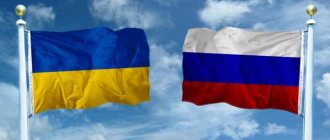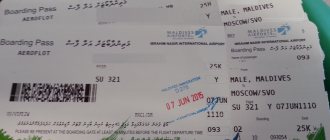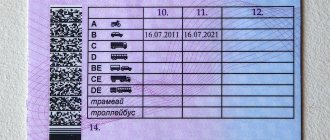Every year, thousands of foreign citizens are subject to a decision banning entry into Russia. For the authorities taking such a restrictive measure, this is reality and commonplace; for those who are subject to the ban, there are dire consequences. It is important to remember that if you are on this list, then you should not ignore the decision of the authorized bodies: attempting to cross the border in the presence of a current ban is a criminal offense. Today, such a restrictive measure is a reaction on the part of the state to unlawful acts committed by a citizen. From a technical point of view, this is a mark in the unified database of the Border Directorate of the FSB of the Russian Federation - the competent agency that is responsible for the passage of foreigners across the state border. Today we will try to consider the most common reasons for entry restrictions, give valuable advice on appealing the decision, and also prove that timely assistance from a qualified migration lawyer is the only way to successfully resolve the problem.
Who can impose a ban?
It must be remembered that the list of departments that can make a decision is strictly limited and provided for by law. If, in the case of expulsion, a court makes a decision, then any of the following departments has the right to take restrictive measures in relation to foreign citizens:
- Ministry of Internal Affairs - for violation by foreigners of current administrative or migration legislation. It is the employees of the Ministry of Internal Affairs who have the primary right to establish an entry ban. According to statistics, 95% of decisions are made through this department. After the FMS was abolished in 2014, its powers began to be exercised by law enforcement officers.
- FSB - for committing illegal actions that pose a threat to the state system of the Russian Federation, extremism and terrorism.
- Ministry of Defense - for conducting intelligence activities or espionage for foreign states.
- Rosfinmonitoring – for financial fraud and violation of tax laws.
- Rospotrebnadzor – in relation to persons who suffer from socially dangerous diseases or are carriers of infection.
- Ministry of Justice - in relation to previously convicted foreign citizens.
- Ministry of Foreign Affairs - in relation to unfriendly diplomatic workers.
In some cases, an entry ban is adopted after a court order, but even in this situation, a restrictive measure is taken through the Ministry of Internal Affairs for violation of migration or administrative legislation. Each department is guided by its own internal criteria, but the lifting of the entry ban is possible only in one way - through the court.
Where should I go to lift the entry ban - to the Ministry of Internal Affairs or to the court?
Here are the main points that need to be taken into account in order to correctly lift the entry ban and not be refused, as well as not waste time:
- Determine for yourself what exactly happened in relation to you by government agencies. Was the entry ban established by the Main Directorate of Migration Affairs of the Ministry of Internal Affairs or was it the result of your deportation or a court decision on deportation? If this is an independent entry ban, then in order to remove it you have the right to contact both its initiator (for example, the Main Directorate of the Ministry of Internal Affairs of the Russian Federation for Moscow) and the court. If you have already been deported before or the court has issued a ruling on your expulsion, then the ban can only be lifted through the court. If, in the event of deportation, you contact the Main Department of Migration Affairs of the Ministry of Internal Affairs, the Russian Embassy in your country and other government bodies, you will simply waste a lot of time and ultimately receive an answer about the need to go to court.
- Specific entry bans are issued in the regional departments of the department and you need to contact them there. Contacting the Main Directorate for Migration Affairs of the Ministry of Internal Affairs will only lead to an increase in the time for consideration of materials, since they will be redirected to the initiator of this case.
- Remember that the deadline for filing an appeal against the ban is 3 months . If you do not have time to submit the necessary documents during this period, government authorities have the right not to consider the materials and issue you a refusal.
- If the initiator of the ban was such departments as the FSB, Rospotrebnadzor, the Ministry of Justice and a number of other structures, then their decisions and orders can only be appealed in court. These departments, unlike the Main Directorate for Migration Affairs of the Ministry of Internal Affairs, are not vested with the authority to cancel their decisions. Decisions and orders in these departments are signed, as a rule, by the heads of the department or their deputies. In view of this, a ban on entry can be lifted not in any court, but only in the one whose jurisdiction includes the territory where the department is located.
- Appeals to the Administration of the President of the Russian Federation and the Commissioner for Human Rights will only play a role if you have already gone through all other departments. Contacting them as soon as you become aware of the ban does not lead to anything. The widespread myth that if I “write to the President”, then everything will be immediately canceled or quickly reviewed - alas, nothing more than a myth, not confirmed by practice. The appeal, of course, will be accepted, but they will not be considered, but will be redirected to the same initiator of the ban. In this case, you will lose a lot of time. Remember the importance of timing in point 4.
- When taking into account the timing of applications for lifting the entry ban, one should take into account the presence of usually large queues and pre-registration. Ignoring this fact may lead to loss of the right to appeal due to delay.
- An important point - if you are not applying under your own prohibition, but represent the interests of your relative or friend, then a notarized power of attorney will be a mandatory document. Moreover, in this category of cases, a special text corresponding to the CAS of the Russian Federation is required, as well as a separate indication of the powers under the Federal Law “On the Protection of Personal Data”. Failure to do so may result in your materials being rejected and not being admitted.
- Be sure to take into account that if the ban is not imposed on you, then in accordance with the CAS of the Russian Federation you need not only a power of attorney, but also a higher legal education. A copy of the diploma is a required document.
- The CAS of the Russian Federation will help you correctly determine jurisdiction. If work is underway to cancel deportation or expulsion, the rules are already specified in the Code of Administrative Offenses of the Russian Federation. The appeal system in these Codes is significantly different; before proceeding, you must familiarize yourself with the laws. Ignoring the rules inevitably leads to refusal and return of materials, loss of deadlines and the right to appeal.
Contrary to popular belief, it is impossible to lift the entry ban right at the border. According to the current legislation, border guards are not required to do this. There is a certain procedure for this.
Many foreigners, faced with all this bureaucracy, give up and return to their countries to wait for the ban to end. This cannot be done, just like crossing the border illegally. If you do this, in Russia you will receive a prison sentence or lifelong deportation...
In my many years of experience, in most cases it takes about 3-4 months to lift an entry ban in court. Having resolved the problem, you can calmly and legally continue your residence and work in Russia.
It’s up to you to decide which way to go...
In most cases, when some people gave up, a smart legal solution could be found. It’s just that people didn’t initially understand the matter properly, preferring to dig around on their own on the Internet, on various forums, or consult with friends. You can immediately sort everything out at my professional legal consultation.
Often the problem arises precisely because people themselves confuse everything with their illiterate actions, thinking that they are acting correctly.
Each case should be handled by a specialist in this field. This truth has already confirmed itself for centuries.
If you don’t know how to deal with the problem yourself and lift the entry ban, please contact me for advice, at least online.
I am a professional migration lawyer and we will find the best way out of any current situation.
The terms of cancellation, the composition of documents, conditions and price of services depend on the specific circumstances of the situation.
Answers to frequently asked questions during consultations:
When the FSB issues an entry ban (under Clause 1, Part 1, Article 27 of Federal Law No. 114), can it be lifted?
Yes, lifting the ban on entry into the Russian Federation from the FSB is possible. In most cases, notifications from the FSB indicate that the entry ban was applied on the basis of paragraph 1 of Part 1 of Art. 27 FZ-114 “On the procedure for entry into the Russian Federation and exit from the Russian Federation.” The department does not provide any reasons or other circumstances for the ban. In accordance with the law, according to this norm, it is allowed to prohibit entry into the Russian Federation if this is necessary in order to ensure the defense capability or security of the state, or public order, or the protection of public health. The FSB operates only with part of this norm, applying prohibitions in cases where the presence of a foreigner in the Russian Federation is undesirable for reasons of ensuring state security. The materials are drawn up in the form of a Decision on the undesirability of a foreigner’s stay (residence) in the Russian Federation (less often in the form of a Decision on non-permission to enter the Russian Federation) and are transferred for execution to the Main Directorate for Migration of the Ministry of Internal Affairs and the Border Service of the FSB of Russia. Thus, a foreigner is denied not only entry into the Russian Federation (including transit), but also any formalities on the territory of the state. It is characteristic that the restrictions apply not only to the territory of the Russian Federation, but also to the territory of the Republic of Belarus. The duration of such bans varies; in practice, there have been 3-year, 5-year bans, and for a period of 15, 25, 30, 45 years, as well as lifelong ones. Bans from the FSB have a number of nuances and the procedure for canceling them differs significantly from other appeals. By the nature of its activities, the FSB is directly related to cases of a special nature related to state security and state secrets. The overwhelming majority of documents are classified as “secret”. Documents on the ban are among them. In order to understand the problem, understand its essence, prove your case and appeal against restrictions on entry and stay in the Russian Federation, you need to go to court. This is the only course of action in this case. However, in court there will also be specifics. To go through such a process, you need to prepare very seriously. In practice, formalities play a big role and incorrect preparation of the claim and materials can harm you.
Grounds for the decision to ban entry
The current legislation of the Russian Federation regarding foreign citizens puts forward a wide list of reasons why entry into the country can be prohibited. More detailed information about this can be obtained from the text of Federal Law No. 114. If you carefully read the grounds listed there, some are not serious offenses. So, a ban can be obtained in the following cases:
- The foreign citizen violated the terms of stay on the territory of Russia provided for by the Federal Law and did not leave the country in a timely manner. If at the same time he stayed in the Russian Federation for no more than 90 days, he can receive an entry ban for 3 years. Illegal stay for a period of 90 to 180 days faces a ban for 5 years, and if more than 180 days, then for 10 years.
- A foreign citizen working in the Russian Federation paid tax using incorrect details or missed the payment date for a patent. In this case, the latter is automatically canceled, and the person loses the right to stay in the territory of the Russian Federation and work for more than 90 days. As legal practice shows, staying in a country with an invalid patent is one of the most popular reasons for receiving an entry ban.
- The person was brought to administrative responsibility several times (2 or more) for minor offenses - obscene language in a public place, smoking or drinking alcohol in unauthorized places, violating traffic rules, ignoring temporary registration, and much more.
- The citizen deliberately distorted information about himself or hid the true reasons for his stay in Russia.
- When crossing the border, the person violated sanitary or customs rules. In this case, a decision is made on a temporary ban until the identified violations are eliminated.
The reasons described above may become a reason for restrictive measures by the state. Some cases are considered individually, but there is a list of violations for which an entry ban is certain:
- During a previous stay in Russia, the foreign citizen terminated the readmission procedure.
- A citizen has a criminal record for intentionally committing a crime, and it does not matter in which country this happened.
- The foreigner does not have the required amount of money to live in the Russian Federation or has not provided a complete package of documents for obtaining a visa.
- The person used false documents, for example, tried to enter the country after deportation using a false passport.
- The foreign citizen evaded paying taxes, fines and costs of his deportation during his previous stay in the country.
- The foreigner stayed in the country for more than 90 days in each half-year.
Reasons why a ban on entry into the Russian Federation is established
The Federal Migration Service of the Russian Federation may establish a ban for a list of reasons:
- Border and sanitary rules were violated when crossing Russian customs.
- The foreigner provided false information about himself.
- Over the past 3 years, he has been involved in an administrative offense.
- During the year, more than two administrative offenses were committed.
- During his last visit to the Russian Federation, the migrant did not leave the country on time.
At the same time, the migrant may not even realize that he cannot come to Russia, since there are no notifications about this, and the FMS does not notify migrants about this. Often people from the CIS countries and other countries become aware of the restriction right at customs when they try to cross the border and return to Russia after a short stay in another country. If the presence of an entry ban is discovered at customs, the foreigner will have to return home. In this situation, nothing can be changed. But you can always find out in advance about the fact of the ban, and then you won’t have to adjust your plans to the situation right at customs and go back. This can be done online by providing the necessary information on the migration service website. The check will display whether the entry ban is in effect or not.
Is it possible to lift the entry ban?
If you use the help of an experienced migration lawyer, you can successfully resolve even the most difficult situation. Practice shows that it is most difficult to appeal a ban issued by the Ministry of Defense or the FSB, but even such restrictive measures are sometimes lifted.
If the decision to ban was made by the Department of Internal Affairs, and the offense committed by a foreign citizen is minor, you can try to cancel the restriction through the same department. In other cases, the algorithm of actions is the same - filing a corresponding statement of claim with a judicial authority on the territory of the Russian Federation.
What are the goals of deportation?
Deportation is a universal measure. It applies in the following cases:
- A foreign citizen entered the territory of the Russian Federation illegally;
- A foreign citizen violated the rules for crossing the border;
- A foreign citizen provided incorrect information about himself when registering with the Federal Migration Service;
- A foreign citizen violates the conditions of stay on the territory of the Russian Federation;
- The foreign citizen does not update documents (TRP, asylum permit);
- A foreign citizen commits offenses on Russian territory.
As is not difficult to notice from this list, it serves to rid the territory of the Russian Federation of individual foreign criminals and gangs, prevent illegal emigration and complicate the illegal transit of prohibited goods. That is, its main goal is to reduce the crime rate and stabilize the economic situation in the country.
What can serve as a basis for lifting the ban?
Here is a list of the most common reasons to count on the lifting of restrictive measures:
- Presence of close relatives - citizens of the Russian Federation. These include parents, legitimate children and spouses. In some cases, it is enough for brothers, sisters, grandfathers or grandmothers to live in Russia, but for this it is necessary to prove the fact of dependence and cohabitation with them. In practice, there have been situations when the entry ban was lifted in the presence of close relatives who only had a residence permit.
- Carrying out labor activities in the Russian Federation with a work permit or labor patent. As stated earlier, this is one of the most common reasons for a ban. If violations were committed during the validity period of the patent, the foreign citizen completed re-registration in a timely manner and made all necessary payments, the ban can be canceled.
- The foreigner has a temporary residence permit or residence permit in the Russian Federation.
- The need for emergency treatment, which is confirmed by relevant extracts from medical documents and doctor’s recommendations.
- Studying at an educational institution that has state accreditation.
In order to count on a successful appeal against the decision, take care in advance to prepare a package of documents. All certificates and certificates must be translated into Russian, and this should only be done by a Russian translator. Each document must be certified by a notary.
How can deportation be lifted if appealing does not help?
A foreigner can try to lift deportation under the following conditions:
- He has a spouse on the territory of the Russian Federation who has Russian citizenship;
- The foreigner has relatives permanently residing in the Russian Federation who have Russian citizenship;
- The foreigner has a temporary residence permit, residence permit or work permit;
- If a foreign citizen undergoes treatment that is impossible to carry out in his home country;
- If the foreigner is a student.
In this case, the court's decision on deportation may be replaced by another measure. However, in some particularly serious cases, even the fulfillment of these conditions does not guarantee that the foreigner will remain on Russian territory.
Package of documents for lifting the entry ban
The general list of documents depends on which agency restricts you from crossing the Russian border. Any grounds specified in the statement of claim to the court must be supported by documents. If you want evidence to be accepted and taken into account by the court, get a preliminary consultation from a competent lawyer who will help you develop tactics, find strong arguments and begin collecting evidence and documentation based on them. The standard package includes:
- Personal documents of a foreign citizen - passport, patent, employment contract, temporary residence permit, registration and much more;
- A written response from the Department of Migration upon the relevant request;
- Evidence of the presence of relatives in the Russian Federation, the need for training or treatment;
- Any written evidence that positively characterizes the applicant and may be a mitigating circumstance for the court.
Application for lifting the entry ban. Form and example.
Today we will tell you how to correctly write an application for lifting an entry ban if you decide to lift the ban yourself through the court. If you are interested in the question of how to lift an entry ban, then we want to warn you that the main problem of people who do not practice in the field of law in writing applications to the Ministry of Internal Affairs or statements of claim for lifting an entry ban is the unstructured presentation of factual circumstances and insufficiency legal justification, which is why employees of the Ministry of Internal Affairs or judges, reading such statements and objectively not having much time to understand the mistakes you have made, do not get a full understanding of your position as an applicant, and, of course, refuse to appeal the entry ban. Therefore, we will try to give you a certain structure and logic of presentation that you should adhere to when writing an application to lift the entry ban, and also explain how to lift the entry ban and correctly support your position with the appropriate legal grounds.
Our podcast “How to lift the ban on entry into the Russian Federation?” →
You can follow us on social networks and contact us with any questions you may have.
Our video instruction on this topic
instructions on how to correctly write an application and claim for lifting the entry ban
Here is an example (form) of an application to lift the entry ban.
These are the points that should be clearly visible in the application for lifting the entry ban:
- Description of the main factual circumstances of the case;
- Your position as an applicant;
- Legal basis of the stated requirements;
- Stated requirements;
- Application in the form of the necessary supporting certified copies of documents.
When you decide to independently decide the question of how to lift the entry ban, remember that when describing the facts, it is important to give the court a correct idea of you and your family ties with citizens of the Russian Federation - this is of great importance. We mean precisely a description of the status of citizenship: which country you are a citizen of, the main documents confirming the presence of this status. Then it is worth providing information (if any) about family ties with citizens of the Russian Federation (are you, for example, the father of a child who is a citizen of the Russian Federation, does your family live in the territory of the Russian Federation). When describing these facts, it is necessary and obligatory to refer to documents confirming them - birth certificate, passport, marriage certificate. Subsequently, the decision-making body is obliged to take these facts into account, which may help you appeal the entry ban. Then you need to focus your attention on reflecting all the facts about the decision made against you to ban you from entering the territory of the Russian Federation. In particular, it is necessary to indicate which body made the decision, as well as the possible grounds that formed the basis for the ban on your entry into the territory of the Russian Federation. The next point should be to indicate that your stay on the territory of the Russian Federation does not create a real threat to the defense capability, security, public order, public health, as well as the foundations of the constitutional system, morality, rights and legitimate interests of the rights and legitimate interests of other persons. This may also help you lift your entry ban. And finally, concluding the first part of the application to lift the entry ban, you should pay special attention to the illegality of the ban, as well as to the fact of violation of the rights of both you and your family, expressed in the separation of you and your children and family. Family members must not live in different states. Indication of this circumstance should not be neglected: it can also play an important role in lifting the ban through the court.
The next important block of the application for lifting the entry ban is a statement of your legal position. All information contained in this block must clearly indicate the illegality of the entry ban. At the same time, you should indicate a list of your rights that were violated in connection with the decision.
Clients constantly come to us with questions about how to lift the entry ban, and to do it legally, so we emphasize: the most important part of the application for lifting the entry ban is the substantiation of the fact of violation of your rights. In this section you need to refer to the regulations in which the rights are secured. In this context, it is important to note that you have every right to refer not only to national legal sources (the Constitution of the Russian Federation, Federal laws, etc.) but also to universal international treaties of which the Russian Federation is a member (the Universal Declaration of Human Rights, the Convention on Fundamental Rights rights and freedoms). To substantiate your claims, you can also use the legal positions contained in the decisions of the European Court of Human Rights. A well-formulated justification for your legal position and your stated demands will help lift the entry ban.
After substantiating your legal position and the illegality of the actions of the body that issued the entry ban against you, it is worth specifically indicating the list of your demands (this part of the statement usually begins with the words: “The applicant asks the court:”, “I ask the court:”). Based on the purpose of writing the application, your main requirement will be the cancellation of the unlawfully made decision to not allow entry into the territory of the Russian Federation. It is also necessary to indicate all contact information through which you can receive all the necessary documents on the case (up-to-date email address, for example, also be sure to indicate the address of actual residence, otherwise you will not receive a certified copy of the final court decision, and you will have to make an additional request to court to obtain it).
At the end of the entire application, you indicate a list of attachments in the application, in which you record a list of all the documents that you provided in the application. (passports, birth certificates, etc.). We remind you that you must attach certified copies of documents (including notarized translations of documents made in a foreign language), in the original you will only have a receipt for payment of the state fee.
We have tried to provide as clear instructions as possible in response to your questions about how to lift the entry ban, and we hope that it will be useful to you.
Timing and prospects
The length of time it takes to consider the issue depends on how you are trying to lift the ban. If through the Department of Internal Affairs - then from 1 to 3 months, if in court - from 2 months or more. If the ruling of the first instance court is not in your favor, a lot of time is spent on appeals and cassation. In legal practice, there have been cases when a foreign citizen’s entry ban has already expired, and legal disputes have not ended.
It is for this reason that we recommend that you seek the help of a competent immigration lawyer. When you are in the territory of another state, it is better to entrust the appeal of the ban to an authorized representative in the Russian Federation. It is he who will take upon himself the preparation of the statement of claim, communication with the authorized bodies, finding out the reasons for the ban, and studying the materials of the administrative proceedings. Without timely legal assistance, it is almost impossible to count on success in court.
Where and how to check the presence or absence of a ban?
In order to check whether there is a restriction, you need to go to the official website of the Main Directorate for Migration of the Ministry of Internal Affairs of Russia and fill out a special form.
If there are grounds for not allowing entry, the system will notify you of this, indicating the initiator’s department.
This information will allow you to find out exactly where to go for more detailed information about the exact reason for the ban on entry into the Russian Federation and its lifting.
Accurate information can be obtained from the Central Data Bank for Registration of Foreign Citizens and Stateless Persons (CDB UIG) on the basis of a written request to the divisions of the Ministry of Internal Affairs of Russia.
Court decisions
The case of purchasing dietary supplements on credit
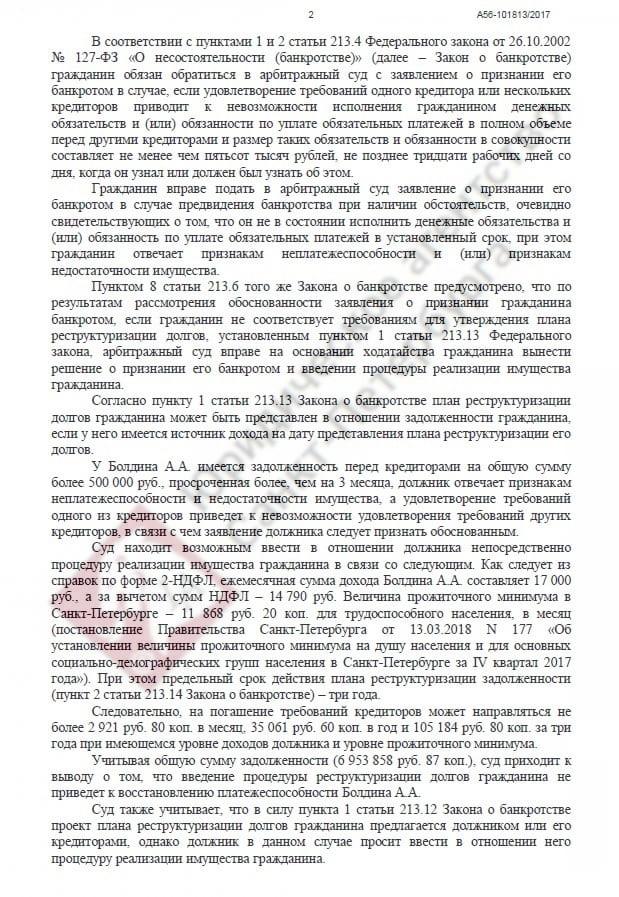
How to declare yourself bankrupt in a short time
Driver hits drunk pedestrian
The case of an overdue loan: how to reduce penalties
When dividing property, the court left the wife an apartment purchased during marriage
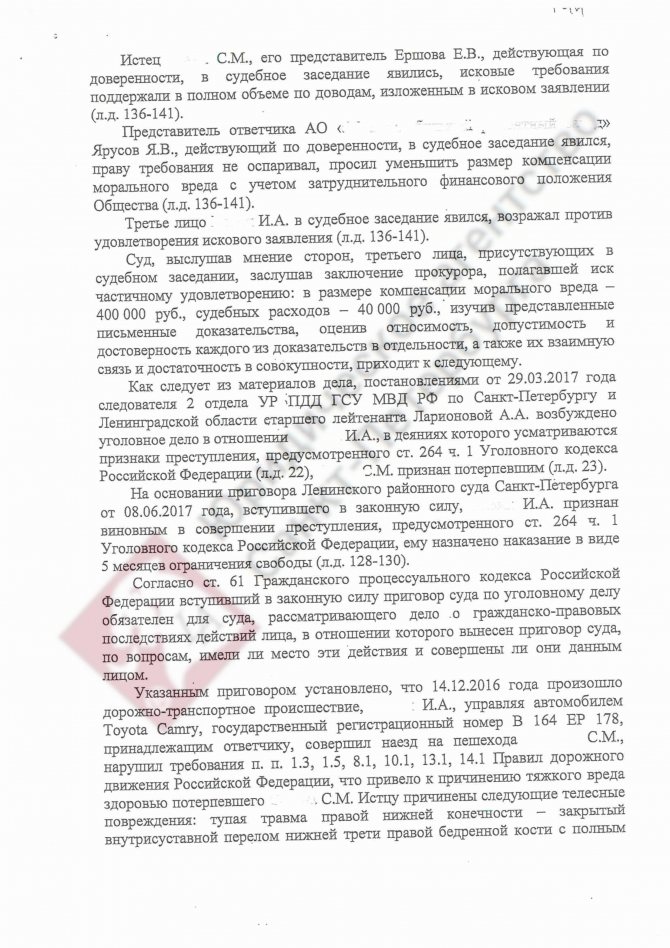
Pedestrian hit case
Customer Reviews
Feedback from Solovyova I would like to express my deep gratitude to lawyer Konstantin Vasilyevich Solovyov for his qualified assistance in resolving my issue. The decision was made in my favor, for which I am very grateful. I would also like to express my gratitude to the company’s team for their sensitive attitude towards clients.
Gratitude from A.P. Sovenova and E.Ya. Komudina Dear lawyers!
Please accept our deep gratitude for your attention, professional approach and desire to help people. We especially want to highlight Dmitry Germanovich, Denis Yuryevich, Daria Valentinovna.
Best regards, A.P. Sovenov, E.Ya. Komudina
Review by B.I. Goreky Gratitude to Yuri Vladimirovich from B.I. Goreky for the consultation on family rights.
Gratitude from gr. Bogodyazh N.G. I, Bogodyazh N.G. turned to the Legal Agency of St. Petersburg for help in a dispute with the company RTC JSC regarding the refusal to return the goods in accordance with the rules of trade, thereby my consumer rights were violated.
Thanks to the company’s lawyer, Stepanov D.Yu., I was able to return the money for the low-quality product, and I also received an apology from my opponent. I would like to express my gratitude for the qualified assistance provided to me by D. Yu. Stepanov and the Legal Agency of St. Petersburg.
With gratitude, Bogodyazh.
Thanks to Pavlyuchenko A.V. from Radhuan M. Dear Pavlyuchenko Alexander Viktorovich. Let me express my sincere gratitude for the qualified legal assistance provided. Thanks to your professionalism, I was able to achieve a decision in my favor. I wish you further prosperity and professionalism.
Radhuan Mohamed 06/08/2018
Review by Rychnikova G.V. I express my gratitude to your employee Andrey Valerievich Ermakov for providing me with legal assistance.
I also express my gratitude to Diana Sumarokova for her polite and tactful customer service and the very pleasant atmosphere in your office.
Gratitude to Vasily Anatolyevich Dear Lyubov Vladimirovna.
I would like to express my gratitude to Vasily Anatolyevich for his competent legal assistance in solving my difficult case. I wish you and your company further prosperity and success in your hard work.
From the bottom of my heart and with best wishes. 05/03/2018
Review by Marcheilo I.V. On September 24, 2021, I turned to Konstantin Vasilievich for legal advice. I would like to express my gratitude for your sensitive, attentive attitude and qualified assistance. I received a comprehensive answer to all my questions. They helped a lot. Thank you! Sincerely, Marcheilo Irina Vladimirovna.
Thanks to Pavlyuchenko A.V. from Astafieva A.S. I express my gratitude to the Legal Agency and in particular to lawyer Alexander Viktorovich Pavlyuchenko for the work done, high qualifications and high-quality approach. Thanks to Alexander Viktorovich, we managed to achieve a result in court in a case on the protection of consumer rights that I did not even expect. The amount recovered in court even exceeded my expectations. Thank you very much for your qualified work and professionalism.
Sincerely, Astafieva A.S., 03/01/2019
Review by G.N. Antropova To the lawyer of the Legal Agency of St. Petersburg A.V. Ermakov
I express my gratitude to you for your professionalism in protecting my interests in a criminal case, Andrey Valerievich, allow me to express my gratitude to you for your help and support. I note your high professionalism and skillful actions in defending my positions.
Best regards, G.N. Antropov
Basic documents
Two documents that will be required in any case are an application to lift the entry ban, as well as a copy of the foreign citizen’s passport, which has a notarized translation of all its pages. If everything is clear with the copy of the passport, then the application must be drawn up manually in free form. There are no restrictions, it is important to simply indicate:
- The most complete information about the citizen who submits the application.
- Information about documents.
- Reasons why a decision may need to be overturned.
The court may provide you with a sample of this statement that you can use as a reference.
